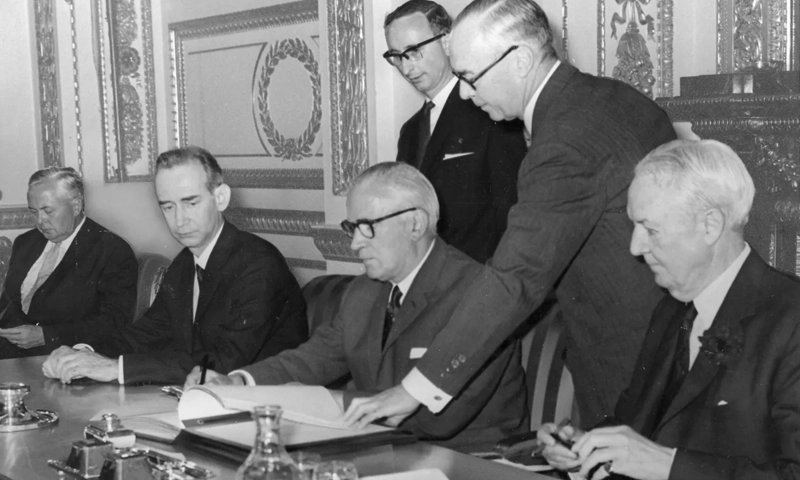- Web
- Feb 20, 2026
What is the nuclear Non-Proliferation Treaty?
-

- Reuters
- Jun 16, 2025

ISLAMABAD: Iran said on Monday its parliament was preparing a bill that could push the Islamic Republic towards exiting the nuclear Non-Proliferation Treaty.
Israel began military strikes on Iran on June 13, citing concerns over its nuclear programme, one day after the UN nuclear watchdog’s Board of Governors declared Tehran in breach of its obligations under the NPT.
Iran, which denies trying to develop nuclear arms, has fired missiles at Israel in retaliation for Israel’s strikes.
Below are some key facts about the treaty.
PURPOSE OF THE NPT
The objective of the treaty, which took effect in 1970, is to halt the spread of nuclear weapons-making capability, guarantee the right of all members to develop nuclear energy for peaceful ends and – for the original five nuclear weapons powers – to phase out their arsenals.
Also read: Israel and Iran strike at each other in new wave of attacks
The treaty defines nuclear-armed states as those that “manufactured and exploded a nuclear weapon or other nuclear device prior to January 1, 1967. They are the United States, Britain, France, China and Russia, which assumed rights and obligations from the former Soviet Union. Those five nations are the permanent members of the UN Security Council.
SIGNATORIES
A total of 191 countries are party to the NPT. Nuclear weapons states agree not to transfer those weapons or to help non-nuclear states obtain them.
NON-SIGNATORIES
Two non-signatories, India and Pakistan, developed nuclear weapons. Another, Israel, is widely assumed to have a nuclear arsenal but has not confirmed or denied it publicly.
North Korea signed the treaty in 1985 but announced its withdrawal in 2003 after US officials confronted it with evidence they said pointed to a covert enrichment programme. After a rapprochement, North Korea expelled IAEA inspectors again in 2009, and they have not returned since.
ESCAPE CLAUSE
The treaty is divided into 11 articles, including one that enables a state to withdraw “”if it decides that extraordinary events … have jeopardized the supreme interests of its country”. A state must give three months’ notice to other treaty members and the UN Security Council.
TREATY REVIEWS
States that are party to the NPT meet to review it every five years. The next review conference is due to be held in 2026.
IRAN
Iran has been a non-nuclear-weapon signatory to the NPT since 1970. It has a uranium enrichment programme that it says is for peaceful purposes, not developing weapons, but Western powers and Israel suspect it intends to develop the means to make atomic bombs.
The declaration by the International Atomic Energy Agency’s 35-nation Board of Governors on June 13 that Iran is in breach of its non-proliferation obligations was the first such decision in almost 20 years and followed a damning report that the IAEA sent to member states on May 31.
The resolution adopted by the board cited Tehran’s “many failures to uphold its obligations since 2019 to provide the Agency with full and timely cooperation regarding undeclared nuclear material and activities at multiple undeclared locations in Iran”.
ISSUES OF CONCERN
A central issue of concern for the IAEA is Iran’s failure to provide credible explanations of how uranium traces detected at undeclared sites in Iran came to be there despite the agency having investigated the issue for years. The IAEA believes they mostly point to activities carried out more than 20 years ago.
Iran’s foreign ministry and atomic energy organisation said in response that the Islamic Republic had always adhered to its safeguards obligations. They said the IAEA’s findings were politically motivated and lacked technical or legal foundation.
Asked at a press conference about Tehran potentially leaving the NPT, a foreign ministry spokesperson reiterated Tehran’s official stance against developing nuclear weapons but said: “In light of recent developments, we will take an appropriate decision. Government has to enforce parliament bills but such a proposal is just being prepared and we will coordinate in the later stages with parliament.”
NUCLEAR SANCTIONS
Sanctions were imposed on Iran in 2006 after it failed to comply with a UN Security Council resolution demanding a halt to its uranium enrichment programme.
Iran agreed to restrain its nuclear programme, while still enriching to a low level, in return for relief from economic sanctions under a deal reached with six major powers in 2015, but President Donald Trump pulled the United States out of the agreement in 2018, reimposing US sanctions.
Iran subsequently retaliated by ramping up its nuclear programme, abandoning the restrictions imposed by the deal. Iran and the United States have engaged in indirect talks since April to try to impose fresh restrictions on Iran’s atomic activities in exchange for sanctions relief.




